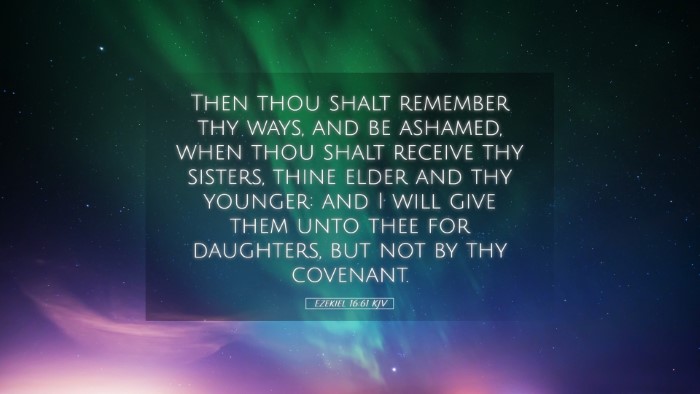Ezekiel 16:61 - Commentary Overview
Verse Context: Ezekiel 16:61 states, “Then you will remember your ways and be ashamed when you receive your sisters, both your older and younger; I will give them to you as daughters, but not because of your covenant with them.” This verse is part of a larger metaphor where God speaks through Ezekiel, portraying Jerusalem as an unfaithful wife and comparing it to both the daughters of a possibly foreign lineage.
Commentary Analysis
Interpretation of the Verse
The verse calls for a reflection on the past sins committed by Jerusalem, leading to a deep sense of shame. It indicates a future scenario where Jerusalem will be restored and gifted with sisters, representing other nations, and yet this restoration is not based on merit but on God’s covenantal mercy.
The Role of Memory and Shame
Matthew Henry emphasizes the importance of memory in this verse. He suggests that to remember one’s ways is crucial for repentance. The shame that follows recognition of past transgressions indicates a heartfelt contrition. This moment of remembrance is a pathway leading towards restoration, where one acknowledges sins not just in general but specifically how they have acted towards God.
Restoration in Context
Albert Barnes notes that the reference to receiving sisters points to a broader restoration of Israel, which will include alliances with neighboring nations that were once seen as enemies. This restoration comes through God’s grace and not human effort. The mention of ‘sisters’ complicates the notion of exclusivity with respect to God’s people, implying an expansion of God's covenantal love beyond initial boundaries.
Moral Implications
Adam Clarke discusses the moral implications embedded within the text. He asserts that the act of remembering one’s past failures brings about a crucial humility. This experience of shame should lead to a renewed identity as God’s chosen people. Clarke interprets God’s promise to give them daughters not merely as an extension of blessing but as a means to establish a new sense of unity among God’s people.
Theological Significance
Covenant and Redemption
The theological underpinnings of Ezekiel 16:61 are foundational for understanding the nature of God’s relationships with His people. The sovereignty of God's covenant is highlighted here; while Jerusalem's unfaithfulness is palpable, God’s commitment remains steadfast. The verse underscores that redemption is ultimately an act of divine grace.
Role in Salvation History
Henry's insights delve into salvation history, indicating that the narrative of sin and redemption in the Old Testament finds its fullness in the New Testament through Christ. This idea reflects the trajectory of the biblical story where shame transforms into gladness through the work of the Redeemer.
Relevance for Today
Contemporary Application
For today’s pastors and theologians, Ezekiel 16:61 serves as a powerful reminder of God’s persistent grace amidst human failures. In a world drawing lines of division and exclusivity, the text encourages a church that actively embraces all under the umbrella of God’s love—reminding believers that shame from the past can be redeemed in the community, symbolized by the ‘sisters’—those previously regarded as ‘other’.
Ethical Reflection
Students of the Bible are reminded through this verse that ethical living comes from understanding our past and accepting God’s redemptive work. As people reflect on their behaviors, there lies an opportunity for transformation, leading not just to personal but also community restoration. This aligns well with the broader themes of reconciliation found throughout Scripture.
Conclusion
Ezekiel 16:61 encapsulates the essence of Israel's journey through disgrace, recognition, and eventual restoration. It illustrates significant themes of memory, shame, covenant, and redemption that remain relevant to modern believers. Engaging with public domain commentaries such as those of Matthew Henry, Albert Barnes, and Adam Clarke provides a well-rounded theological understanding that can inform preaching and teaching on this pivotal verse. As we reflect on this text, may we too embrace the God who restores, aligning our lives under His gracious covenant.


